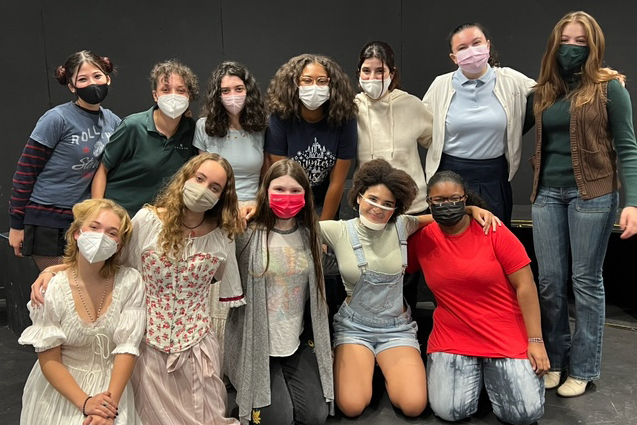From heavy dramas to classic period pieces, Drama Queens take the stage once again
Photo credit: Tracy Poverstein
The Drama Queens, sophomore, junior and senior advanced theater students, pose for a picture after their first show of the 2021-2022 school year. DRAMA QUEENS. Remi Cannon (’24), Azel Al-Kadiri (’23), Guinevere Hesse (’24), Glory Chase (’22), Justine Moore (’22). BACK. Lucy Lassman (’23), Marin Terry (’23), Zoe Bush (’22), Anaiya Asomugha (’24), Lou Michaelson (’24), Grace Delossa (’23) and Mia Ronn (’23).
December 7, 2021
CW: This article mentions sexual assault.
For the first time in nearly two years, the Drama Queens started rehearsing their lines and practicing their secret pre-show traditions in preparation for the audience to fill the Blackbox Theatre. A buzz of connectedness and community filled the room as the faculty and students took their seats on Oct. 15.
The Drama Queens — an advanced elective theatre course made up of upper school students — prepared monologues to meet the criteria needed to compete in the Spotlight Awards. These monologues varied from period pieces and spins on classic stories like “Sense and Sensibility” and “Lost Girl,” to dramatic scenes that dealt with heavy and more mature topics like “Love, Loss and What I Wore.”
Senior Drama Queen member Zoe Bush, who played Wendy in a scene from “Lost Girl,” appreciated being able to re-craft and make creative decisions for her character along with parts of her monologue since it was originally filled with a vast amount of detail.
“It was amazing because last year we did all virtual shows, and although I had fun, there’s nothing like connecting with an audience and hearing their reactions,” Bush said.
For her first performance as a member of Drama Queens, junior Mia Ronn delivered a monologue from the play “Love, Loss and What I Wore,” by Nora and Delia Ephron, adapted from the book by Irene Beckerman. In the scene, she played Merrill, who speaks to a women’s support group about her experiences with sexual assault.
“I think that a lot of the girls who were on Zoom last year are probably even more grateful than me to be [back in person] because I’ve heard it was really hard, and it must have been,” Ronn said.
Ronn is not new to theatre, but she took a break from acting during the COVID-19 pandemic. She was enthusiastic about joining Drama Queens and very excited to be performing again. Many other members shared the same excitement and anticipation to join.
“[Performing] was definitely very different. But at the same time, it’s something I’ve looked forward to since I came to Archer,” new sophomore member Remi Cannon said. “I’ve always looked up to the Drama Queens and their ability to perform independently, so I was very, very excited.”
While Archer was practicing virtual learning during the 2020-2021 school year, many current sophomore, junior and senior advanced theatre students took theatre classes and performed on Zoom. After returning to in-person learning, they soon realized that one large part of theatre that they missed was the audience. Bush reflected on what she wanted the audience to take away from her performance.
“I want the audience to understand just how important it is to attend live theatre because there’s no other medium like it where you get to connect like that,” Bush said.
Cannon played Elinor from “Sense and Sensibility” by Kate Hamill, adapted from the book by Jane Austen. Like her fellow Drama Queens members, she also felt reassured by the audience. Cannon added that she was excited to perform again, but after being on Zoom for so long, she felt nervous, and her hands even started to shake as she began her scene.
“You feed off the crowd in live theatre, whereas over Zoom, it’s so awkward and quiet. So I definitely think I enjoyed my live performance a lot more and was able to somewhat benefit off my nervousness and use it in my performance,” Cannon said.
After virtual learning, theatre teacher Tracy Poverstein described the Drama Queens as more than ready to perform in front of a live audience again. They were also very eager to experiment with new genres, such as dramatic period pieces or comedies, that would challenge them to grow.
“[The show] went even better because even though everyone’s been at home, I told the Drama Queens it’s almost like they have been marinating at home, and they were ready for more depth in their material and to take new risks,” Poverstein said.Advanced theatre students experimented with scenes that were unlike anything they have performed before. Bush normally picks comedic scenes for Drama Queens shows, but she chose to deliver a dramatic monologue for the first show this year. She found interpreting the emotions of her scene to be compelling since she prefers to focus on comedic timing when she does comedy.
“I tried to think of the motivations behind the character, the situation they’re in and how I would react if I was in that situation and through their lens, how they would react,” Bush said.
Ronn also decided to perform a dramatic monologue that included heavy topics such as sexual assault. When she is acting, one key factor she focuses on while getting into character is having a good understanding of her role and the characters actions and emotions.
“I think that the biggest thing there is understanding the character and making choices yourself — I think you don’t always have all the gaps filled in,” Ronn said. “I think choosing those things for yourself really helps you get into their shoes. And I think that’s one of the most beautiful parts of acting is being able to see life from somebody else’s perspective.”
A theme that Poverstein, Cannon, Bush and Ronn all emphasized was the feeling of community, connectedness and sisterhood that fills the air whenever the Drama Queens are together. Cannon remembered how she and the other members were feeling nervous before the show because of the amount of preparation they had to do with little time.
“I think just really comforting ourselves through that like made a little lot better,” Cannon said. “And just to know that everyone was on the same page about how we were feeling and it was really sweet. It really, really helped calm my nerves.”
Another key aspect of theatre that Poverstein explained the importance of were the ideas of were transparency and exposure to complex subjects, which are especially relevant after the pandemic; when many people have started speaking more openly about subjects like mental health and social issues.
“One of the benefits of theatre is people learn that just because we have feelings or reactions to things that are hard to discuss, it doesn’t mean that we’re going to be broken if you’re exposed to difficult conversations or difficult topics,” Poverstein said.
The Drama Queens are currently working on small one-person shows, a type of acting that they have never explored thoroughly before. They are looking forward to using the freedom they were given, aside from some guidelines, to create and tell their own stories.
“The way that we collaborate is really so helped by how different we all are,” Ronn said. “We all have different approaches to theatre; some people are really strong in comedies and people are really strong in drama. I think it all it all comes together so beautifully.”










Maia Alvarez • Dec 7, 2021 at 4:31 pm
Whoo! Great article Nina!! Even though I wasn’t able to come to this event, this article allows me to be immersed into these monologues and gets me excited for the next Drama Queens performance!